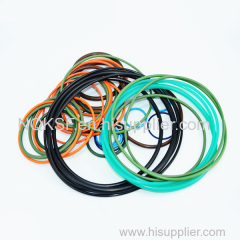
Hot Sale O Ring Seal Kinds Of Sizes All In Stock NBR FKM Silicone Rubber O-Rings
| Min. Order: | 500 Piece/Pieces |
|---|---|
| Trade Term: | EXW |
| Payment Terms: | Paypal, L/C, D/P, D/A, T/T, WU, Money Gram |
| Supply Ability: | 10000000 |
| Place of Origin: | Hebei |
Company Profile
| Location: | Xingtai, Hebei, China (Mainland) |
|---|---|
| Business Type: | Manufacturer |
Product Detail
| Means of Transport: | Ocean, Air, Land |
|---|---|
| Standard or Nonstandard: | Standard |
| Style: | O Ring |
| Material: | Rubber |
| Brand Name: | nqksf |
| Production Capacity: | 10000000 |
| Packing: | 10 pcs/ 1 paper scroll |
| Delivery Date: | 7-15 |
Product Description
Selecting the appropriate O-ring seal is crucial for the optimal performance and longevity of various mechanical systems. From industrial machinery to household appliances, the right O-ring can prevent leaks and maintain pressure. This article delves into the multifaceted considerations for choosing the right O-ring seal, ensuring that your choice meets the specific needs of your application.
Evaluating Application Needs
1. Temperature Range: One of the primary factors in selecting an O-ring is the operating temperature range. Silicone O-rings, for instance, perform well in extreme temperatures, making them suitable for both high-heat and freezing conditions.
Pressure Requirements: Assess the pressure the O-ring will be subjected to. High-pressure environments, such as hydraulic systems, require O-rings made from materials like HNBR or polyurethane, which offer superior resistance to pressure.
2. Chemical Compatibility
Fluid Interaction: The O-ring material must be resistant to the chemicals it will encounter. For example, EPDM O-rings are excellent for water and steam applications but unsuitable for oil-based applications. Conversely, FKM O-rings are highly resistant to oils, fuels, and solvents.
Long-Term Exposure: Consider the long-term exposure effects of the chemicals. Some materials may degrade over time when exposed to specific chemicals, affecting the seal's performance and durability.
3. Material Properties
Mechanical Strength: Evaluate the mechanical properties such as hardness (durometer), tensile strength, and elongation. For applications requiring flexibility, softer materials like silicone or nitrile might be ideal, while more rigid materials like PTFE are suitable for high-wear environments.
Abrasion and Wear Resistance: In dynamic applications where the O-ring is subjected to motion, materials with high abrasion resistance, such as polyurethane, are essential to prevent rapid wear.
4. Sizing and Standards
Standard Sizes: Utilize O-rings that conform to standard sizes (AS568, ISO 3601) to ensure compatibility and ease of replacement. Custom sizes can be used but may require additional lead time and cost.
Precision Measurement: Accurate measurement of the O-ring and groove dimensions is critical. Ensure that the O-ring's ID, OD, and CS precisely match the groove specifications to maintain an effective seal.
5. Installation Techniques
Proper Handling: During installation, handle O-rings carefully to avoid cuts or nicks. Use tools designed for O-ring installation to prevent damage.
Lubrication and Alignment: Apply compatible lubricants to reduce friction during installation and ensure the O-ring is properly seated. Misalignment can cause leaks and reduce the seal's effectiveness.
6. Testing and Validation
Initial Testing: Perform initial testing under actual operating conditions to validate the O-ring's performance. This can include pressure testing, thermal cycling, and chemical exposure tests.
Ongoing Evaluation: Continuously monitor the O-ring's performance through regular maintenance checks. Look for signs of wear, hardening, or chemical attack and replace O-rings as needed to maintain system integrity.
Choosing the right O-ring seal involves understanding the specific requirements of your application, selecting appropriate materials, ensuring precise sizing, and employing proper installation techniques. By considering these aspects and validating performance through testing, you can ensure that your O-ring seals provide effective and reliable sealing.

